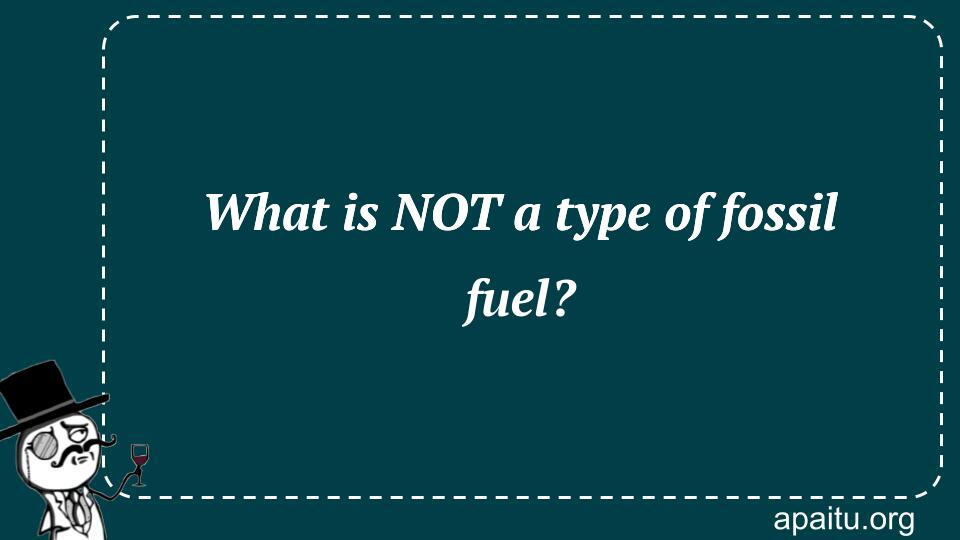Question
Here is the question : WHAT IS NOT A TYPE OF FOSSIL FUEL?
Option
Here is the option for the question :
- Coal
- Natural gas
- Oil
- Nuclear
The Answer:
And, the answer for the the question is :
Explanation:
Fossil fuels are created from organic stuff, such as plants and animals, that has decomposed and converted into carbon compounds present in the Earth’s crust. These fuels account for the majority of the overall energy consumed in the US. Fossil fuels are regarded as nonrenewable resources since it takes millions of years for new deposits to occur. Alternative energy sources are being studied by scientists, including sustainable ones like wind and geothermal energy.

When we think of energy sources that power our modern world, fossil fuels often come to mind. These resources, formed from the remains of ancient plants and animals, have been crucial in meeting our energy demands for centuries. However, it is important to note that not all sources of energy fall under the category of fossil fuels. One such example is nuclear energy.
Nuclear energy is a powerful and unique form of energy that is harnessed through nuclear reactions. Unlike fossil fuels, which rely on the combustion of organic matter, nuclear energy is generated by splitting or combining atomic nuclei. This process, known as nuclear fission or fusion, releases an enormous amount of energy.
Nuclear power plants utilize controlled nuclear fission reactions to produce heat, which is then converted into electricity. The fuel used in nuclear reactors is typically uranium or plutonium, both of which have unstable atomic nuclei. Through controlled chain reactions, the nuclei of these elements are split, releasing a tremendous amount of energy in the form of heat.
While nuclear energy has its advantages, such as its high energy output and low greenhouse gas emissions, it is essential to recognize that it is distinct from fossil fuels. Fossil fuels, such as coal, oil, and natural gas, are derived from ancient organic matter that has undergone geological processes over millions of years. These fuels release carbon dioxide and other greenhouse gases when burned, contributing to climate change and air pollution.
On the other hand, nuclear energy does not emit greenhouse gases during the generation of electricity. It provides a relatively clean and efficient source of power, making it an attractive alternative to fossil fuels in terms of reducing carbon emissions and combating climate change. However, it is worth noting that nuclear energy does present challenges in terms of waste management, safety concerns, and the potential for nuclear accidents.
there are other types of non-fossil fuel energy sources that play a significant role in our energy landscape. Renewable energy sources, such as solar, wind, hydroelectric, and geothermal power, harness natural processes or resources that are constantly replenished. These sources offer sustainable alternatives to fossil fuels and contribute to diversifying our energy mix.
Solar energy harnesses the power of sunlight through photovoltaic cells, while wind energy utilizes the kinetic energy of moving air. Hydroelectric power taps into the energy of flowing or falling water, and geothermal power utilizes heat from within the Earth. These renewable sources provide clean and abundant energy, reducing our reliance on fossil fuels and their environmental impact.
while fossil fuels have long been the dominant source of energy, it is important to recognize that not all energy sources fall under this category. Nuclear energy, which harnesses the power of nuclear reactions, is a distinct and separate form of energy. It offers advantages such as high energy output and low greenhouse gas emissions, but it also comes with its own set of challenges. Additionally, there are other non-fossil fuel energy sources, such as renewable energy, which provide sustainable alternatives to fossil fuels. Understanding and exploring these diverse energy sources is vital as we strive towards a more sustainable and environmentally friendly future.